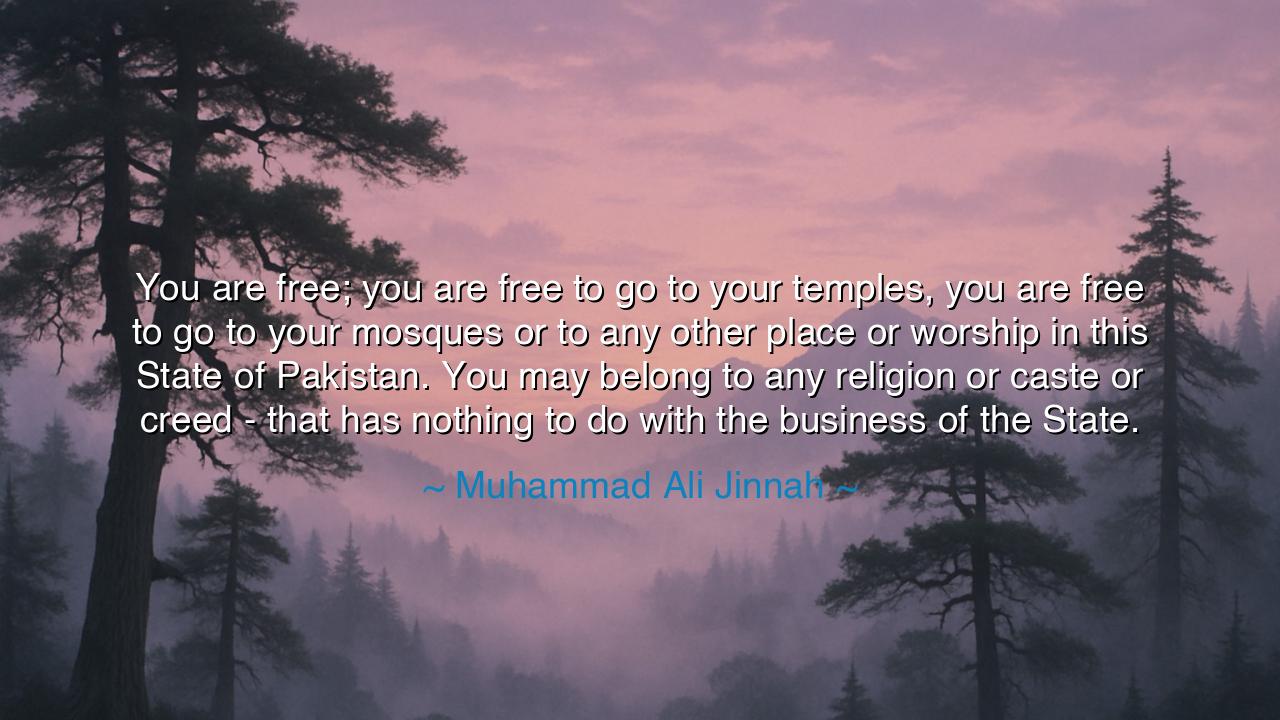
You are free; you are free to go to your temples, you are free to
You are free; you are free to go to your temples, you are free to go to your mosques or to any other place or worship in this State of Pakistan. You may belong to any religion or caste or creed - that has nothing to do with the business of the State.






Host: The soft glow of the lamp illuminated the quiet room, casting long shadows against the walls. Outside, the world was bustling, the sounds of the evening merging with the occasional honking of cars and chatter from nearby streets. Inside, Jack and Jeeny sat at the table, their coffee cups untouched as they pondered the words of Muhammad Ali Jinnah, a reminder of freedom and tolerance in a world where such ideals are sometimes hard to hold onto.
Jack: “Jinnah’s words here are so powerful. He talks about the freedom to worship, to belong to any religion or creed, and that the State has no business in that. Freedom—that’s the key, isn’t it? But here’s the thing: freedom is something we all claim to want, but how many of us truly live it, especially when it comes to something as personal as religion? Can a state really separate itself from the deeply ingrained beliefs of its people?”
Jeeny: “That’s the beauty of what Jinnah was advocating, Jack. He wasn’t just talking about religious freedom in the sense of allowing people to practice their beliefs. He was emphasizing that the state should remain neutral, unbiased, and allow people to coexist regardless of their differences. The idea of having freedom of worship, regardless of religion or creed, is about creating a society where diversity is not just accepted but celebrated.”
Jack: “But is it really that simple? I mean, freedom sounds great, but in practice, it’s often far messier. If you think about it, there’s always this tension between freedom and order. Religious freedom sounds wonderful, but there’s a reason that religion and politics have always been intertwined—especially in countries like Pakistan. People’s beliefs are deeply tied to their identities, and the state can’t just sit back and pretend those things don’t affect how laws and policies are shaped.”
Jeeny: “I get what you’re saying, but that’s where Jinnah’s vision stands out. He was talking about a pluralistic society, where differences aren’t a threat to unity. If the state is to be neutral, it means it doesn’t dictate how you worship, or what you believe. It’s not about ignoring religion, but about ensuring that beliefs don’t become dividing lines. The state’s role is to create an environment where people, despite their differences, can live together in harmony, and that’s the freedom Jinnah was talking about.”
Jack: “But how do you actually create that kind of environment? Freedom sounds great in theory, but when push comes to shove, how do you make sure that people aren’t using their beliefs as a tool for division or exclusion? I mean, even in places that claim to be secular, there’s always the risk that politics or religion will overtake each other.”
Jeeny: “I think the key is in the way Jinnah framed it. He didn’t say that people shouldn’t care about their religion; he just said that the state shouldn’t favor one over the other. That’s the heart of secularism—where the government doesn’t get involved in matters of faith. But the people themselves—they have the freedom to believe, to practice, and to engage with their faiths as they see fit. It’s about respect and tolerance for those differences, which is something we too often forget when we see conflict arise.”
Jack: “So it’s about balance. The state doesn’t intervene, but it also protects people’s rights to believe and practice freely. And I suppose the challenge lies in ensuring that this neutrality doesn’t mean indifference—that it’s not about just tolerating people’s differences but about celebrating them as part of a broader community.”
Jeeny: “Exactly. It’s not just about tolerating diversity, but embracing it. That’s the essence of true freedom—the ability to live with differences without them tearing us apart. When you celebrate diversity, you show respect for every individual’s right to believe what they choose. And when that’s enshrined by the state, it provides the foundation for a society that truly values freedom for all.”
Host: The room has fallen into a thoughtful silence. Outside, the city continues to move, but here, Jack and Jeeny remain still, their conversation hanging in the air. The weight of Jinnah’s words, a vision of freedom and unity, lingers between them, a reminder that in a world where divisions seem to grow deeper, true freedom means allowing people to live side by side without judgment or interference.
Jack: “It’s a difficult balance to strike, isn’t it? But I think Jinnah’s vision shows us that it’s not impossible. Respect and freedom—those are the foundations of a society where every person, regardless of their beliefs, can find peace.”
Jeeny: “Yes, it’s about creating a space where people don’t just exist but thrive together, in their diversity, their beliefs, and their differences. Freedom doesn’t mean the absence of differences; it means the ability to respect and accept them without letting them tear us apart.”
Host: As the last rays of light fade outside, the room settles into the quiet peace of shared understanding. Jinnah’s vision, a world where freedom and tolerance guide society, seems as relevant today as it was when it was first spoken. And in this small moment, Jack and Jeeny are reminded of the power of true freedom—not as a right that’s granted, but as something that must be nurtured, respected, and celebrated.






AAdministratorAdministrator
Welcome, honored guests. Please leave a comment, we will respond soon